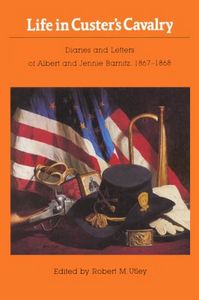"A record of frontier military life that can scarcely be matched elsewhere."-Paul A. Hutton, Journal of American History
Reprint. Originally published: New Haven : Yale University Press, 1977, in the series: Yale Western Americana series.
From arlington cemetary: Albert Trorillo Siders Barnitz was born at Bloody Run, Pennsylvania....During this time Barnitz published a book of poetry,The MysticDelvings (1857).....In 1861 Barnitz joined the 13th Ohio Infantry as a three month volunteer. In August 1861 he enlisted in Company G, 2d Ohio Cavalry and was mustered as a Sergeant. The 2d Ohio Cavalry spent the next year in Missouri and in June 1862 Barnitz was promoted to Second Lieutenant. By February 1863 he had advanced to the rank of senior Captain.
Barnitz spent 1863 in Tennessee, and during a raid he suffered severe injuries when his horse fell on him. Barnitz was wounded in June 1864 at Ashland Station, Virginia. In autumn he returned to his regiment fighting under the command of George Armstrong Custer in the Shenandoah Valley. By 1865 Barnitz was in command of the 2d Ohio Cavalry. He participated in several battles, culminating in the Battle of Appomattox. In September 1865 he returned to civilian life, but in November 1866 he was commissioned a captain in the U. S. Cavalry. The following year Barnitz married Jennie Platt.
For the next two years Barnitz was stationed at various posts, including Fort
Leavenworth, Fort Harker, and Fort Riley, and was involved in Indian campaigns in
Kansas, Texas, Colorado, and the Indian Territory. During the Battle of the Washita River Barnitz was wounded. The severity of the wound forced his retirement in November 1870. He was, however, awarded the rank of brevet colonel for "distinguished gallantry."
